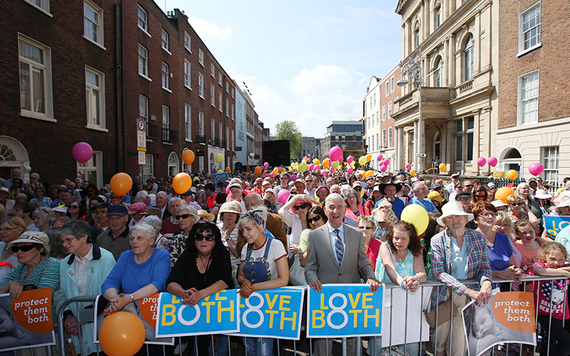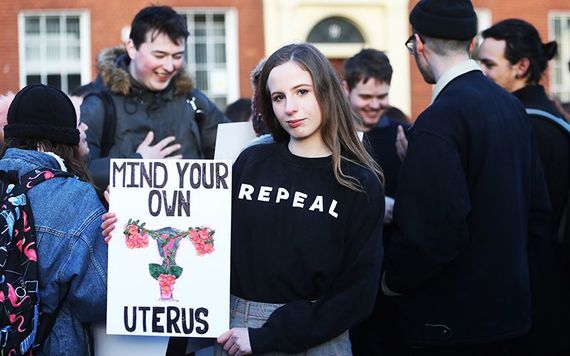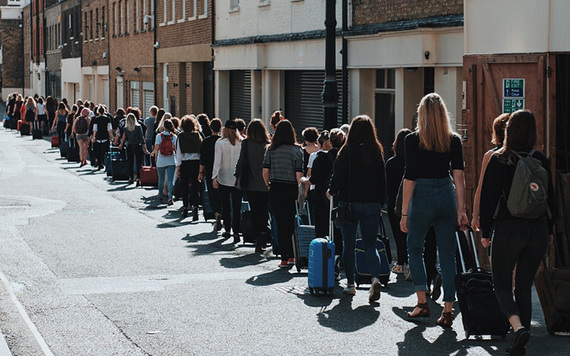The vote on whether to repeal the 8th Amendment of Ireland's constitution, paving the way to change abortion law in Ireland, is set for May 25, and campaigning is taking off.
The referendum to introduce abortion into Ireland is now just over a month away -- the vote will be on May 25 -- and the national campaigns are finally kicking into life after weeks when surprisingly little has been heard from either side. Now it's all action, a bit like a baby in the womb when it gets to the stage when it suddenly begins kicking. Suddenly, like a bad rash that appears overnight, large red anti-abortion posters materialized on lampposts all over Dublin last week.
“A Licence To Kill,” the headline on the most widely used poster said, followed by a line underneath that said “Vote No To Abortion On Demand.” In between on this poster is a picture of a baby in the womb at an early stage of development. It's not one of those upsetting late-stage pictures often deployed by anti-abortion campaigners. Nor is it a very early stage picture when the fetus is a relatively shapeless curve smaller than your little toe.

The pro-life group, Save the 8th's, posters, seen upon lamp-posts around the country.
The picture on these posters which are festooned all over the city is of a 12-week old fetus, a point in development when what is already clearly a baby is taking shape and developing in the womb. A face, body, limbs, even fingers and toes, are all recognizable, even though the fetus is still about the size of your thumb and cannot survive outside the womb.
It's no accident that this picture of a 12-week old fetus in the womb is the one that the Vote No side is using. The proposal from the government is that abortion on demand up to 12 weeks will be made available to women in Ireland if the amendment in the Constitution that now prevents abortion is repealed by the referendum. This limit is similar to that in other European countries, with the exception of Britain where the limit is 24 weeks. It's an effective poster by the anti-abortion side, far better than the garish images they have used in the past of aborted fetuses. It's effective because it makes you think.
Read more: January polls showed clear majority of Irish favor abortion rights up to 12 weeks
Looking at it, you have to decide whether or not it is morally acceptable to end a potential life close to the 12-week limit. The picture makes what is involved in that decision very real.
This emphasis on the 12-week limit is also mirrored in an online campaign with a video fronted by an Irish female doctor who details the development of a fetus over the early months and says that as a medic she could not end such a life. The video has been popping up on many Irish news websites in the past two weeks, so you may have seen it yourself online.
The 12-week poster is one of several effective posters deployed by the Pro-Life/Vote No campaign over the past two weeks. Another claims that “One In Five Babies Are Aborted In England” and says we must vote no to stop the same thing happening here. And another, using a softer approach, features a mother and young child and urges us to “Love Them Both.” In comparison, the Pro-Choice/Vote Yes side has been very slow out of the starting block. In my area on the North Side of Dublin, their posters are out-numbered six to one by the Vote No side.

A pro-life rally with "love both" posters.
Nor are they as effective at grabbing the attention. “Trust Women” is the headline on one of their posters, followed by the message “My Body, My Choice, Vote Yes.” It's a sentiment many people here share, particularly younger people, but it's too predictable, no matter how worthy you think the message is. Of course all this may change in the next week or two as the yes side gears up its campaign.
They have been well ahead in opinion polls, which may have led to some complacency and an expectation that change will come easily given that the population now is more liberal and diverse, as we saw in the successful referendum in 2015 to legalize same-sex marriage. But there is a huge difference between this vote and the one on same-sex marriage. The latter was far easier for Catholics and older voters, who could be generous on the issue without impinging too much on their own beliefs. No life was going to be ended by that decision. It's a far more complicated and difficult issue this time which, no matter how you look at it, does involve ending a potential life.
There has also been a degree of impatience and even anger evident on the repeal side, with many of the younger campaigners (and most of them are young) unwilling to give any hearing to those on the other side of the argument.
They see the issue in simplistic terms as a woman's right to choose and insist that this right trumps everything else. They are dismissive of anyone who disagrees with them and they avoid discussing any rights the unborn may have.

"Mind your own uterus": Women's choice is king for some pro-choice advocates.
But this attitude and sense of entitlement is fraught with danger for the vote yes side because it is certain to antagonize many older, rural voters. They don't like being told how to think by the liberal Dublin elite, the media or by marching students and they could decide to vote no for that reason alone.
The most recent opinion poll showed a significant tightening in the margin between the two sides, and unless the vote yes side is more respectful and convincing in the coming weeks that could get worse.
More than anything, they need to be willing to debate the rights of the unborn and to accept that there is no easy answer to the moral issues involved.
Read more: Irish politician who watched granddaughter live just 58 minutes strongly supports right to abortion
However, based on the size of the lead still held by the yes side, the likelihood remains that the referendum will be successful and abortion on demand up to 12 weeks will become the law in Ireland, bringing us into line with the rest of Europe. And at least one good thing about that will be the ending of the appalling hypocrisy with which Ireland has dealt with abortion up to now.
For decades we pretended that Irish women did not have abortions when the truth was that we were simply exporting the problem. Data from abortion clinics in the U.K. show that 170,216 Irish women had abortions there between 1980 and 2016. And of course the real figure is even higher since some women would not have revealed where they were from.

Pro-choice group in London illustrates hypocracy of current lack of abortion in Ireland by wheeling suitcases.
This hypocrisy resulted not only in the lonely, fearful journeys to clinics in the U.K. forced on so many Irish women over the decades but also in a number of deaths, even in recent years. The 1983 amendment which gave an unborn child and its mother an equal right to life copper-fastened the illegality of abortion in Ireland.
Even in extreme cases in which the mother's life was in some danger, sometimes there was timidity and caution in dealing with her condition if it meant the possible loss of her child. Several such cases (like the Savita Halappanavar case in 2012) made headlines. Others, for example involving delayed chemotherapy treatment for some pregnant women, went almost unnoticed because the consequences could not be proven. Even to get to this point has been torturous. Because of the pressure for change among younger voters, the government established a Citizens Assembly two years ago to discuss abortion.
Its report last year was surprisingly liberal, strongly supporting the introduction of abortion here. The report went to an all-party committee of the Dail which was given the job of making specific recommendations to the government. When those recommendations came they included abortion on demand up to 12 weeks, and this was accepted by Taoiseach Leo Varadkar and the government which then put the referendum in motion.
Read more: Euthanasia for elderly and disabled next says bishop, if Ireland passes abortion vote
It was decided that the referendum would simply ask voters to vote yes or no to the repeal of the 1983 Eighth Amendment to the Constitution, the one which effectively prevents the introduction of abortion here. It will not ask voters to decide on any limit on abortion. But the government has made it crystal clear that a 12-week limit will be introduced immediately in legislation if the referendum succeeds.
There will be a lot of loud and angry debate on this in the coming weeks. But as we have pointed out here before, it will be the silent majority of voters in the middle who will decide the outcome. It won't be the extremes, the pro- choice without any restrictions on one side and the pro-life no matter how difficult the circumstances for the pregnant woman on the other.
At the heart of this debate, whether the pro- choice side likes it or not, will be questions about when life begins, just as it was back in 1983. Is it at the moment of conception, as the Catholic Church and the extreme pro-lifers maintain? Is it at 12 weeks?

Irish artist Maser's iconic Repeal the 8th mural in Temple Bar, Dublin.
Or is it later when a fetus becomes a viable baby which can survive outside the womb? Ironically recent advances in medical ability to deal with very premature babies has made that question even more difficult to answer.
Indeed, there are no easy answers to any of these questions. Even the fetal abnormality issue can be difficult, with much discussion recently in the U.K. on whether mothers of Down Syndrome babies should be entitled to an abortion even at a very late stage. Already the abortion rate there of DS babies is high.
Given all this -- and our history on the matter -- it seems likely that the majority of Irish people will want a reasonable level of protection to be given to the unborn child. The hard part comes when one has to decide exactly when that protection will apply.
It is by no means certain yet that a majority of people here will be happy with setting that point at the proposed 12 week limit.
Read more: Facebook warned to stay out of Irish abortion referendum




Comments